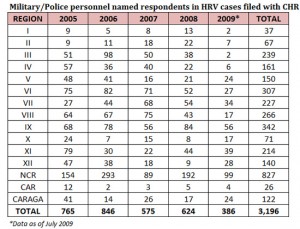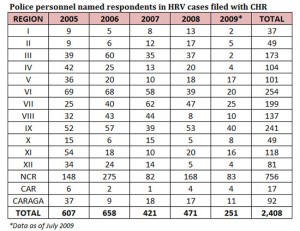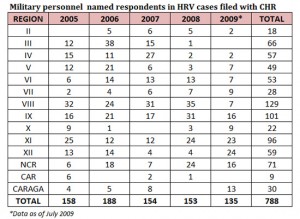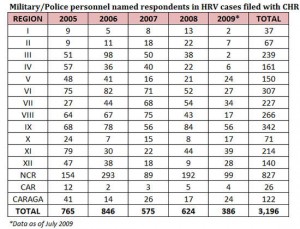By CHIT ESTELLA
 MORE than 3,000 military and police personnel have been accused of human rights violations since 2005, with a “very dismal” rate of conviction.
MORE than 3,000 military and police personnel have been accused of human rights violations since 2005, with a “very dismal” rate of conviction.
Figures from the Commission on Human Rights show that from 2005 to July 2009, a total of 3,196 members of the Armed Forces of the Philippines and the Philippine National Police had been the subject of cases of alleged human rights violation filed with the commission. Of the number, 2,408 were policemen and 788 were military personnel.
CHR Chairperson Loretta Ann Rosales said the average rate of conviction–16 percent– was “very dismal.”
The biggest number of PNP respondents came from the National Capital Region, with 756 policemen accused of human rights violations. This was followed by Region 6 (Western Visayas) with 254 policemen, and Region 9 (Zamboanga Peninsula) with 241.
For the AFP, the biggest number of personnel facing complaints was in Region 8 (Eastern Visayas) with a total of 129. This was followed by Region 9 (Zamboanga Peninsula) with 101 AFP personnel cited in complaints, and by Region 11 (Davao) with 96.
Compared to 2005, fewer PNP and AFP personnel figured in human rights violation complaints in 2008. But the numbers are actually fluctuating. From 765 police and military respondents in 2005, the number rose to 846 in 2006, went down to 575 in 2007 and went up again to 624 in 2008. By mid-2009, 386 members of both forces figured in alleged human rights violations.
 The PNP has about 130,000 members while the AFP has 113,500 active officers and 131,000 reservists.
The PNP has about 130,000 members while the AFP has 113,500 active officers and 131,000 reservists.
The CHR has about 700 staffmembers, most of them clerical, spread out in the regions. Indicating that the commission lacks resources to deal with the many cases filed with it, Rosales bemoaned the slashing of the commission’s budget from P306 million this year to P285 million next year.
“This means our investigators will have to dip into their own pockets for transportation to investigate cases,” she said, especially when they have to go to far-flung areas. She added that she had to persuade Budget Secretary Florencio Abad to restore the cut.
“The P306 million was never enough, to begin with,” Rosales said. The investigation process in human rights cases involves forensic, technical and legal services.
Rosales also said the military and police need to “restructure their thinking and consciousness” with regard to human rights issues.
 “The AFP has long looked at human rights as an issue of the Left which is an enemy,” she said.
“The AFP has long looked at human rights as an issue of the Left which is an enemy,” she said.
But changes may be taking place in the military and police forces.
“I saw the radical transformation of the police in the Bondoc Peninsula,” she said, where the CHR conducted a nine-month human rights training through its Building Bridges for Peace program.
Rosales said the military has also assured her it will give human rights training to all its battalions. The AFP has said it has a manual on human rights, which it is distributing to its various services.
Beyond the AFP and PNP, Rosales said stressed the need to take a holistic view to promote observance of human rights and prevent violations. Human rights must become a mainstream issue and not be regarded as the concern of civil society organizations alone, she said.
“We must address governance and social accountability,” she said.
In addition, Rosales said she envisions “a strong and independent CHR” which must have indisputable authority over human rights issues just like the Commission on Audit’s authority over auditing matters in government.
She said the CHR must professionalize its ranks and set institutional performance evaluation and targets. At the same time, it must tap technical experts who are committed to advancing human rights.
